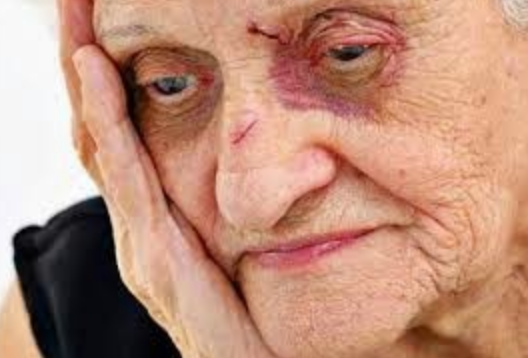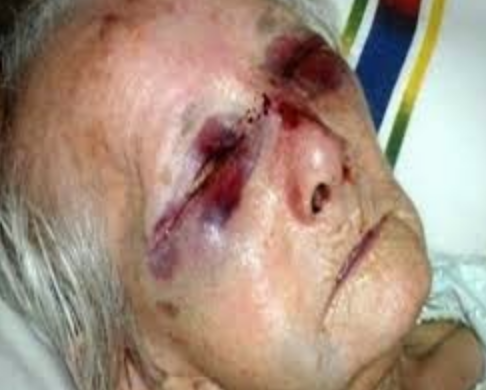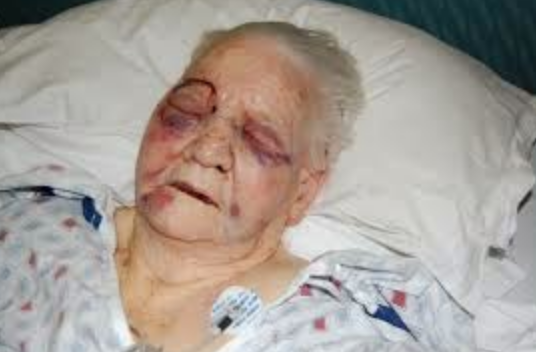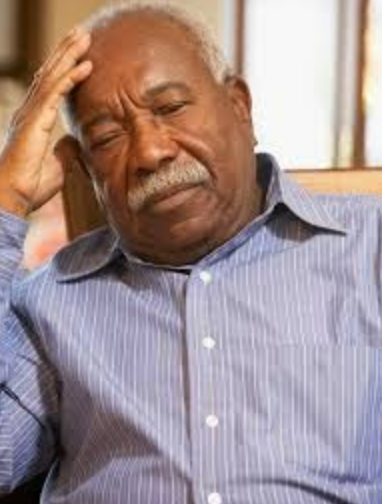Granny-Cams Reveal The Startling Truth of Nursing-Home Abuse
In 2012, Doris Racher noticed that items had begun disappearing from the room of her 96-year old mother, Eryetha Mayberry, a dementia patient in Oklahoma City. Granny-Cams Reveal The Startling Truth of Nursing-Home Abuse
After deciding to put a video surveillance camera resembling an alarm clock in her mother’s room, Racher was horrified to find much more than petty theft occurring – the staff members were emotionally and physically abusive.
Click Here To See Our Vast Inventory of Nanny And Granny-Cams.
A more recent incident occurred in Andover, Kansas when Donna Colcher, a stroke victim and dementia patient at a local nursing home was mistreated by an RN and two nurses aides.
Her husband installed a hidden camera to confirm his suspicions and within 12 hours the video revealed horrific treatment.
Unfortunately, these instances of elder abuse are becoming increasingly common. Shocking stories of stroke patients being taunted and left without food, Alzheimer’s patients being physically abused, and myriad cases of verbal abuse are being exposed due to relatives turning towards the one technology that shows them what’s really happening behind the scenes – surveillance cameras.
One in 20 are mistreated. According to an AlertBulletin published by CNA Financial, one in 20 elderly residents of nursing homes are mistreated, and for each documented case of abuse or neglect, at least five go unreported.
Cleverly called “granny cams,” these surveillance devices are designed to protect residents who may not be able to speak up on instances of abuse by employees, or even resident-on-resident violence.
Georgia Anetzberger is the president of the Washington-based National Committee for the Prevention of Elder Abuse, and she expects an increased number of states to accept surveillance camera usage, as the technology is not so taboo as in past years. “There’s a comfort level with cameras that can catch actions that are disturbing and unlawful,” Anetzberger said. “Without these cameras, it probably wouldn’t be possible to get these kinds of outcomes.”
States are taking action: Currently, there are no states that expressly prohibit granny cams.
In South Carolina, current legislation allows for video footage to be used in both civil and criminal courts.
Oklahoma has a law explicitly permitting the use of cameras in long-term care facilities. This law, as well as in South Carolina, Texas, Maryland and New Mexico, penalizes anyone who tampers with the video surveillance technology.
In both New York and Ohio, state attorney generals have used camera footage in lawsuits against nursing homes.
Maryland and New Mexico have both adopted laws expressly for video surveillance in regard to nursing homes and long-term care facilities. In New Mexico, residents must be informed of their right to video surveillance when entering a long-term care facility.
Following Donna Colcher’s abuse at a federally rated 5-star nursing home in Kansas, state representatives have begun drafting legislation.
Minnesota passed legislation in 2009 giving adult foster-care facilities the right to video surveillance in order to cut down on staff costs; however, this legislation does not specifically address other care facilities.
Tennessee is currently ranked 38th in the country for nursing home care, with responses in a national nursing home study showing poor staffing, a lack of professional care, over medication of residents, and less than three hours per day of direct resident care.
The Florida Senate Judiciary Committee recently approved legislation that will make it more difficult for plaintiffs to seek punitive damages in court against care facilities.
Texas leads the nation in resident-initiated monitoring More than 12 years ago, Texas was the first state to enact legislation on resident-initiated monitoring, and is still the current comparison for other states drafting their own laws.
Texas Law Provides Five Conditions For Resident-Initiated Monitoring:
* Permission must be obtained from the roommates of the resident, and these roommates may include conditions to the agreement (such as the camera never being pointed directly towards them).
* Notices must be posted throughout the nursing home or care facility to notify residents, visitors and staff of the cameras.
* The resident themselves must provide consent for monitoring unless deemed incapable, in which case a family member or relative may make the decision on the resident’s behalf.
Only unedited, un-enhanced recordings or videotapes may be used as evidence in court, and must be time and date-stamped.
* If covert monitoring is discovered, it cannot be considered grounds for discharge but must be brought to video surveillance standards.
As more and more families are turning towards cameras as a way to protect their loved ones, small businesses must be aware of the legislation in their state. Those in favor of video surveillance monitoring believe the cameras would improve the resident’s overall quality of life and their safety, while also lowering theft rates and increasing employee productivity.
Those opposing granny cams are afraid the technology will eventually replace human contact, reduce staff interaction with residents, or even be used to bully residents.
Is the technology of the granny cam an invasion of privacy, or a helpful tool in protecting loved ones unable to protect themselves? What would you do if you suspected a loved one was being mistreated in a nursing home? We encourage you to educate your customers on the available options for protecting what matters.
Updated: 9-23-2022
Labour Pledges To Build National Care Service Enforcing High Standards In Senior Care (AKA Nursing) Homes
Labour has pledged to recruit care workers by guaranteeing fair pay, workers’ rights and appropriate training under a National Care Service as it claimed “too many private equity firms are failing” in their duties to residents.
The party said its research into ratings by the care watchdog had shown around 13% of private equity-owned care homes are not providing good levels of care.
Labour pointed to a review of Care Quality Commission (CQC) ratings at the end of June this year, which it said showed that percentage had received the “requires improvement” rating.
Should it get into power, the party has vowed to build a so-called National Care Service which would see private providers required to meet what it called “decent standards, including delivering quality care for residents and running care homes in a financially sustainable way”.
Labour accused some private equity-owned care homes of spending “hundreds of millions servicing debt and avoiding tax”.
Wes Streeting, shadow health and social care secretary, said: “Care home residents deserve to be well looked after and to have the security of a financially stable care home.
“Too many private equity firms are failing to provide basic levels of care to residents, while gambling with care homes’ futures and leeching millions out of the British taxpayer and the pockets of residents.”
“Meanwhile care workers are leaving in droves to work at places like Amazon, because the pay and conditions are better.
“It’s bad for residents, their families and the taxpayer.”
“The next Labour government will enforce high standards from all providers and kick out those leeching millions out of care.”
“We will recruit the care workers needed to look after residents well by guaranteeing fair pay, full rights at work, and proper training.”
Chris Thomas, head of the Institute for Public Policy Research’s commission on health and prosperity, said: “We welcome this commitment to clean up our social care sector.
“Social care should be about helping people thrive, not just survive – and it is unthinkable that some companies with practices antithetical to that mission are awarded government contracts.”
“Cleaning up care should mean financial regulation: private providers should have a safe level of reserves and demonstrate they are paying their fair share of tax.“
“And a plan should also include minimum ethical standards: paying the real living wage, providing high quality training and demonstrable delivery of high-quality care.”
Related Articles:
A Spy-Gear Arms Race Transforms Modern Divorce
Insurance Tycoon Spied On Women Who Caught His Eye (#GotBitcoin?)
The Fun Of Having Our Gadgets Spy On Us (#GotBitcoin?)
Suspect Chinese Surveillance Gear Offered For Sale To U.S. Government (#GotBitcoin?)
What Your Voice Reveals About You (#GotBitcoin?)
When Battlefield Surveillance Comes To Your Town (#GotBitcoin?)
Pentagon Reviewing Troops’ Use Of Fitness Trackers In Light Of Security Concerns
Fraudsters Used AI To Mimic CEO’s Voice In Unusual Cybercrime Case (#GotBitcoin?)
Pearson Hack Exposed Details on Thousands of U.S. Students (#GotBitcoin?)
Cyber Hack Got Access To Over 700,000 IRS Accounts (#GotBitcoin?)
Take A Road Trip With Hotel Hackers (#GotBitcoin?)
Hackers Target Loyalty Rewards Programs (#GotBitcoin?)
Taxpayer Money Finances IRS “Star Trek” Parody (#GotBitcoin?)
IRS Fails To Prevent $1.6 Billion In Tax Identity Theft (#GotBitcoin?)
IRS Workers Who Failed To Pay Taxes Got Bonuses (#GotBitcoin?)
Trump DOJ Declines To Charge Lois Lerner In IRS Scandal (#GotBitcoin?)
DMV Hacked! Your Personal Records Are Now Being Transmitted To Croatia (#GotBitcoin?)
Poor Cyber Practices Plague The Pentagon (#GotBitcoin?)
Tensions Flare As Hackers Root Out Flaws In Voting Machines (#GotBitcoin?)
Overseas Traders Face Charges For Hacking SEC’s Public Filings Site (#GotBitcoin?)
Group Hacks FBI Websites, Posts Personal Info On Agents. Trump Can’t Protect You! (#GotBitcoin?)
SEC Hack Proves Bitcoin Has Better Data Security (#GotBitcoin?)





Leave a Reply
You must be logged in to post a comment.